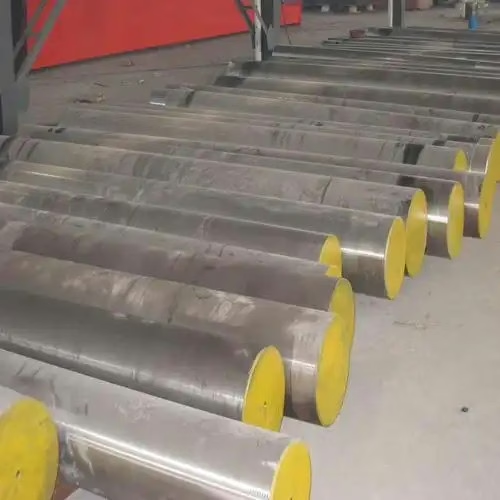Cr2 Steel Technical Overview
Cr2 Steel Technical Overview: Cr2 is a high-carbon, low-alloy tool steel valued for its performance in cutting and tooling applications. At Aobo Steel, we understand that its chromium content is the key to its effectiveness. This addition significantly boosts hardness, hardenability, and wear resistance compared to standard carbon steels, making Cr2 a reliable choice for demanding tooling needs where durability is essential.

1. Cr2 Steel Chemical Composition
Aobo Steel ensures our Cr2 steel meets precise chemical standards to guarantee consistent performance. The typical composition (weight %) is:
- Carbon (C): 95 – 1.10%
- Silicon (Si): ≤ 0.40%
- Manganese (Mn): ≤ 0.40%
- Chromium (Cr): 30 – 1.65% (Key element for hardness and wear resistance)
- Phosphorus (P): ≤ 0.030%
- Sulfur (S): ≤ 0.030%
This controlled composition is fundamental for predictable heat treatment response and achieving reliable final properties.
2. Cr2 Steel Equivalents:
- ISO / EN / DIN: 102Cr6
- JIS: SUJ2
- ASTM / UNS: L3 / T61203
3. Cr2 Steel Physical Properties
Key physical characteristics that influence design and in-service behaviour:
- Density: Approximately 7.83 t/m³
- Thermal Expansion: This coefficient increases with temperature (e.g., 13.29 × 10⁻⁶ /°C from 20-100°C, rising to 15.49 × 10⁻⁶ /°C from 20-700°C). This must be considered in applications requiring high dimensional stability across varying temperatures.
- Thermal Conductivity (at 20°C): Approximately 40.20 W/(m·K) in the annealed state and 37.26 W/(m·K) after quenching. This impacts heat dissipation during use and processing.
4. Cr2 Steel Heat Treatment
Proper heat treatment is essential to unlocking Cr2 steel’s full potential. Its chromium content allows superior hardness and wear resistance compared to simpler high-carbon steels. With our deep experience in tool steels, Aobo Steel can advise you on achieving the best results.
4.1 Normalizing / Annealing
Typically performed at 770-790°C followed by controlled cooling. This refines the structure, improves machinability, and produces a hardness of approximately 187-229 HBW.
4.2 Hardening (Quenching & Tempering):
- Quenching: Austenitize around 830°C. Oil quenching is common for sections under 25mm. For thicker sections (38mm+), oil, alkaline baths, or water/salt solutions may be necessary, depending on geometry, to ensure sufficient hardness and minimize distortion or cracking. Salt bath heating and quenching can yield high, uniform hardness (up to 66-67 HRC).
- Tempering: Crucial after quenching to relieve stress and improve toughness. Tempering around 180°C for 2 hours is standard practice. Note that hardness decreases as tempering temperature increases. Caution is advised when tempering near 250°C, as it can cause volume expansion, potentially affecting precision components.
4.3 Cold Treatment (-70°C)
This treatment can be applied immediately after quenching for applications needing maximum dimensional stability and hardness (it can provide an extra 1-2 HRC).
5. Applications
Cr2’s blend of high hardness, wear resistance, and good dimensional stability makes it a versatile choice for:
- Cutting Tools: Various types of industrial cutters and blades.
- Gauges & Measuring Tools: Templates, gauge blocks, and plug gauges where stability and wear are critical.
- Cold Work Tooling: It is suitable for cold stamping dies, precision pressing dies, cold extrusion dies, and cold upsetting dies, especially for small to medium production runs.
- Rolls: These are used for cold and smaller-diameter rolling mill rolls.
- Wire Drawing Dies: Effective for medium and small-sized dies.
- Bearing Industry Tooling: Dies for cold stamping and cold upsetting operations.
- Other Tooling: Straightening dies, cold drawing dies, cold heading punches (e.g., for internal/external hexagon bolts, often showing improved life), specialized woodworking drills, and various hardware tools.
In some cases, Cr2 can be used as an alternative to 9Cr2 steel, typically operating in the 60-62 HRC hardness range.
Explore Our Other Products
D2/1.2379/SKD11
D3/1.2080/SKD1
D6/1.2436/SKD2
A2/1.23663/SKD12
O1/1.2510/SKS3
O2/1.2842
S1/1.2550
S7/1.2355
DC53
H13/1.2344/SKD61
H11/1.2343/SKD6
H21/1.2581/SKD7
L6/1.2714/SKT4
M2/1.3343/SKH51
M35/1.3243/SKH55
M42/1.3247/SKH59
P20/1.2311
P20+Ni/1.2738
420/1.2083/2Cr13
422 stainless steel
52100 bearing steel
440C stainless steel
4140/42CrMo4/SCM440
4340/34CrNiMo6/1.6582
4130
5140/42Cr4/SCR440
SCM415
🔥 Get a Free Quote + Expert Material Consultation for Your Cr2 Steel Needs! 🔧
At Aobo Steel, we don’t just supply Cr2 tool steel—we help you choose the right specs and treatment for your application.
✅ Factory-direct pricing
✅ Custom cut sizes available
✅ Mill test certificate (MTC) provided
✅ Fast international delivery
